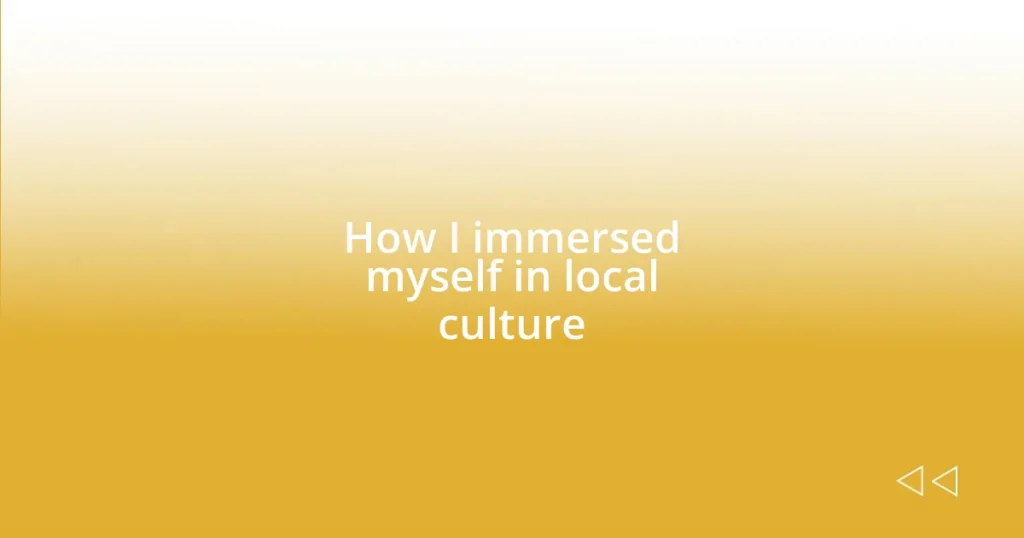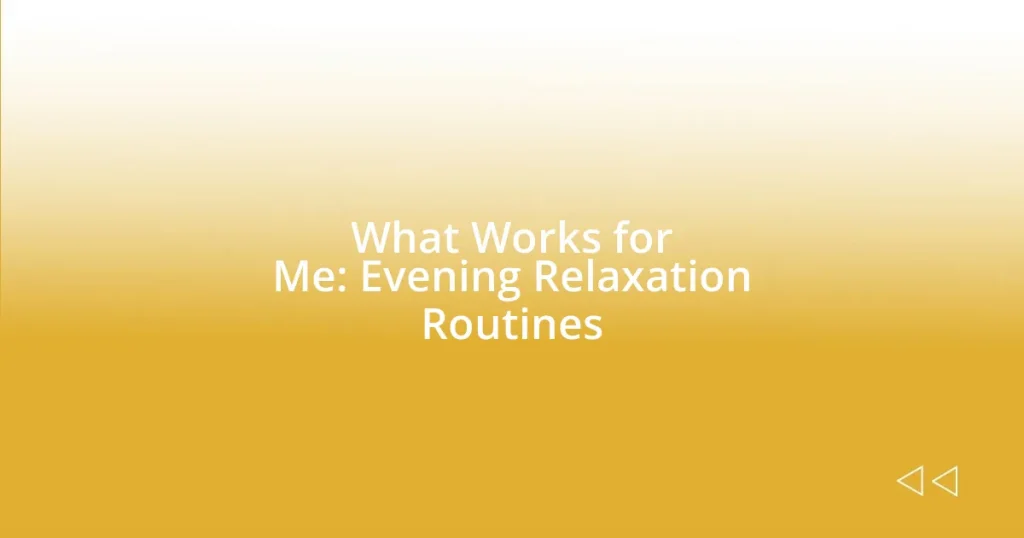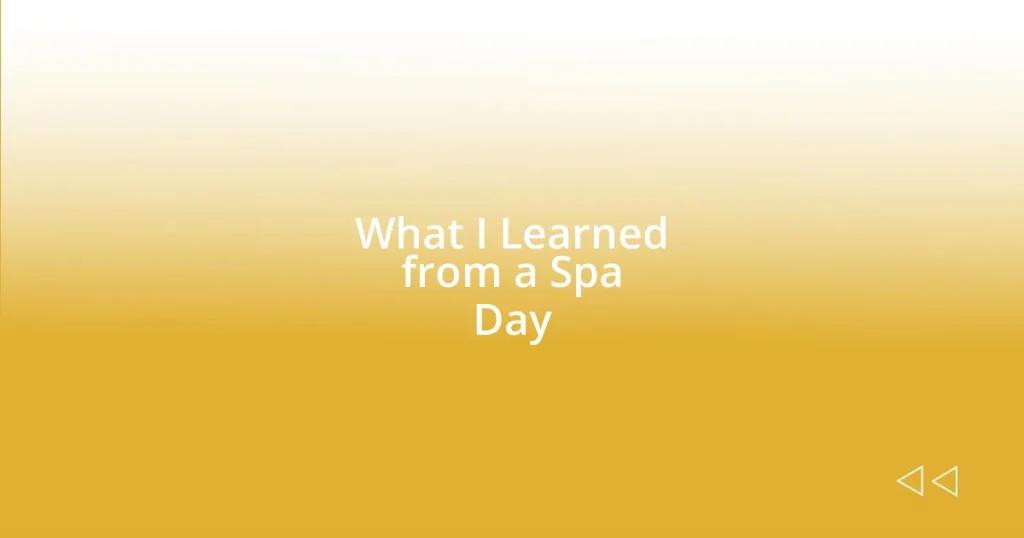Key takeaways:
- Understanding local culture through participation and research fosters deeper connections and appreciation for traditions.
- Engaging with communities and taking part in local events creates lasting bonds and enriches cultural experiences.
- Learning the local language enhances interactions and allows for a more immersive travel experience.
- Exploring local cuisine offers insights into cultural history and offers a universal medium for connection through shared meals.
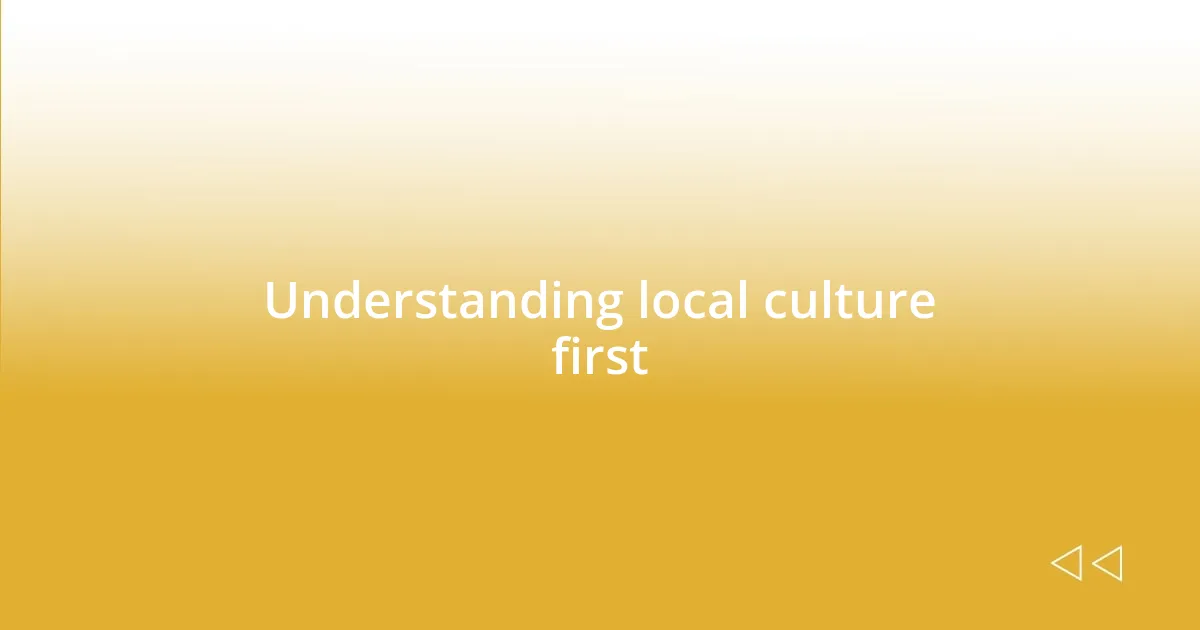
Understanding local culture first
Understanding local culture is essential when immersing yourself in a new place. I remember my first encounter with a cultural festival in a small town in Italy. The vibrant colors, joyous laughter, and shared experiences among locals made me realize that understanding these cultural traditions was a gateway to deeper connections. How could one truly appreciate the warmth of the people without knowing what they value most?
When I took the time to learn about the area’s history and customs, it was like peeling back layers of an onion. I discovered the significance behind the traditions I had initially viewed as mere curiosities. For instance, participating in a cooking class taught me not just about making risotto but the stories and family ties behind each recipe. Isn’t it fascinating how food can narrate a culture’s history?
Engaging with local culture isn’t just about observation; it’s about participation. I vividly recall attending a small community gathering where everyone welcomed me with open arms. It made me feel that understanding local nuances and their shared values transformed my experience into something truly memorable. How can we connect if we don’t first engage with those around us?
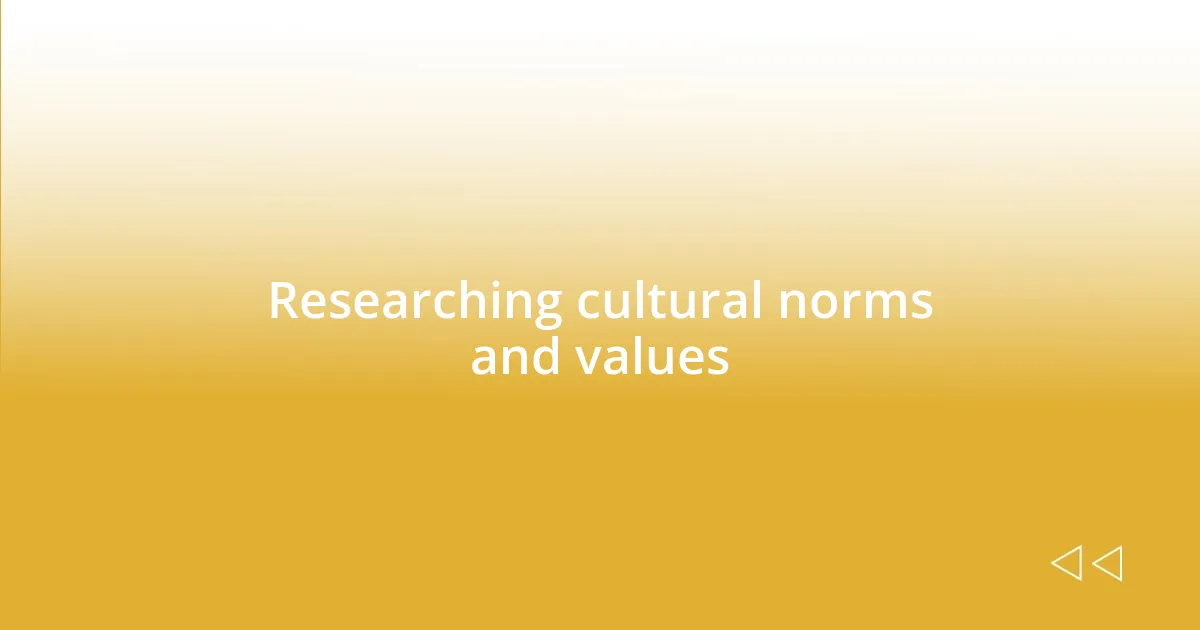
Researching cultural norms and values
When I set out to learn about the cultural norms and values of a new environment, I found that research goes beyond mere facts; it’s about understanding the emotions and motivations behind behaviors. I once dived into the customs of a community in Japan before my visit, spending hours reading about the important role of respect and harmony in everyday life. This knowledge made it easier for me to navigate social situations and forge genuine connections, like when I bowed slightly to greet someone or adhered to their dining etiquette.
To make the research process smoother, I found these strategies helpful:
- Read local literature: Novels, poetry, or even folklore give deep insights into cultural values.
- Explore documentaries: They often showcase how people live, work, and celebrate their traditions.
- Engage with online forums: Local community groups can offer firsthand experiences and tips.
- Attend workshops: Learning traditional arts or crafts can provide practical context for cultural values.
- Ask locals: Sometimes, just asking questions can lead to fascinating revelations and stories.
Approaching cultural research this way transformed my awareness and deepened my appreciation for the communities I engaged with.
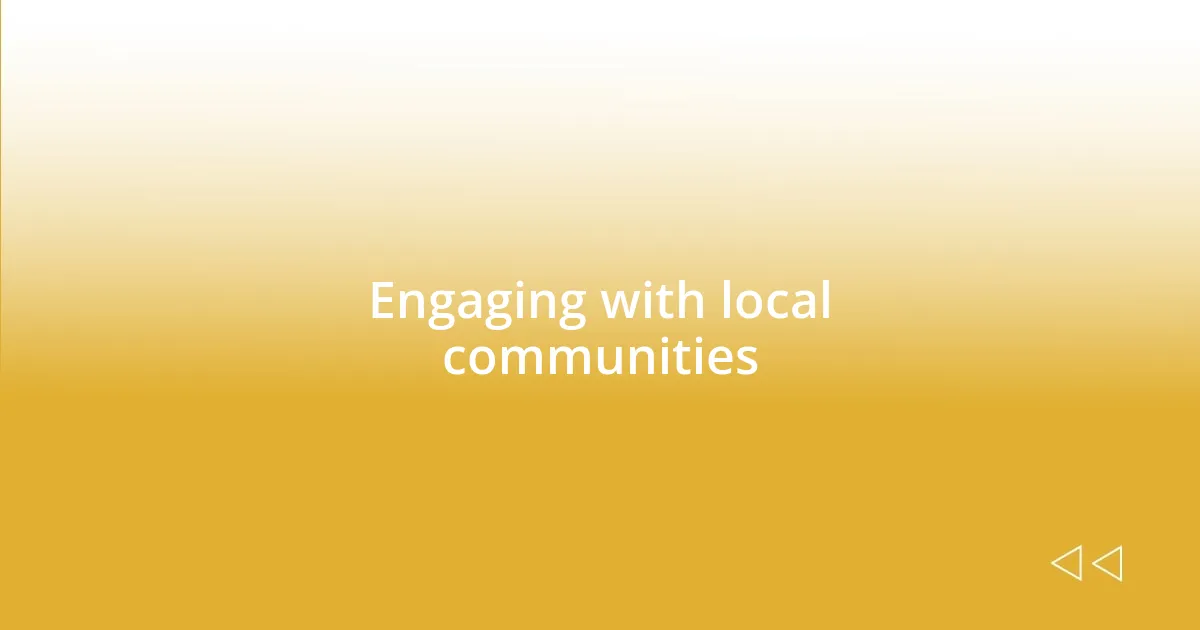
Engaging with local communities
Engaging with local communities is an experience that can redefine your perspective. On one of my trips to Mexico, I joined a volunteer program focusing on education for underprivileged children. I remember the laughter that filled the classroom as we played games and shared stories. The bond I formed with those kids opened my eyes to the importance of community spirit. Isn’t it incredible how giving just a little time can create lasting connections?
Participating in local traditions also deepens your engagement. I once attended a traditional parade in Thailand where locals showcased their cultural heritage through vibrant costumes and dances. As I joined in, waving a flag and dancing alongside them, I felt an overwhelming sense of belonging. It was as if the barriers of language and background melted away in that moment. This is why I believe sharing experiences with locals can lead to profound intercultural exchanges.
In my experience, expressing genuine interest in local lives fosters goodwill. For example, during a homestay in a Balinese village, I offered to help with daily chores. As I swept the courtyard and learned to prepare their meals, I realized how much trust and appreciation blossed from those simple acts. The relationships I built there linger in my heart, reminding me that engaging with others is a two-way street that enriches us both.
| Engagement Method | Personal Experience |
|---|---|
| Volunteering | Taught English to kids in Mexico; laughter and stories created a powerful connection. |
| Participating in festivals | Danced in a Thai parade; felt a sense of belonging beyond language and culture. |
| Helping locals | Learned new skills while homestaying in Bali; built trust through shared tasks. |
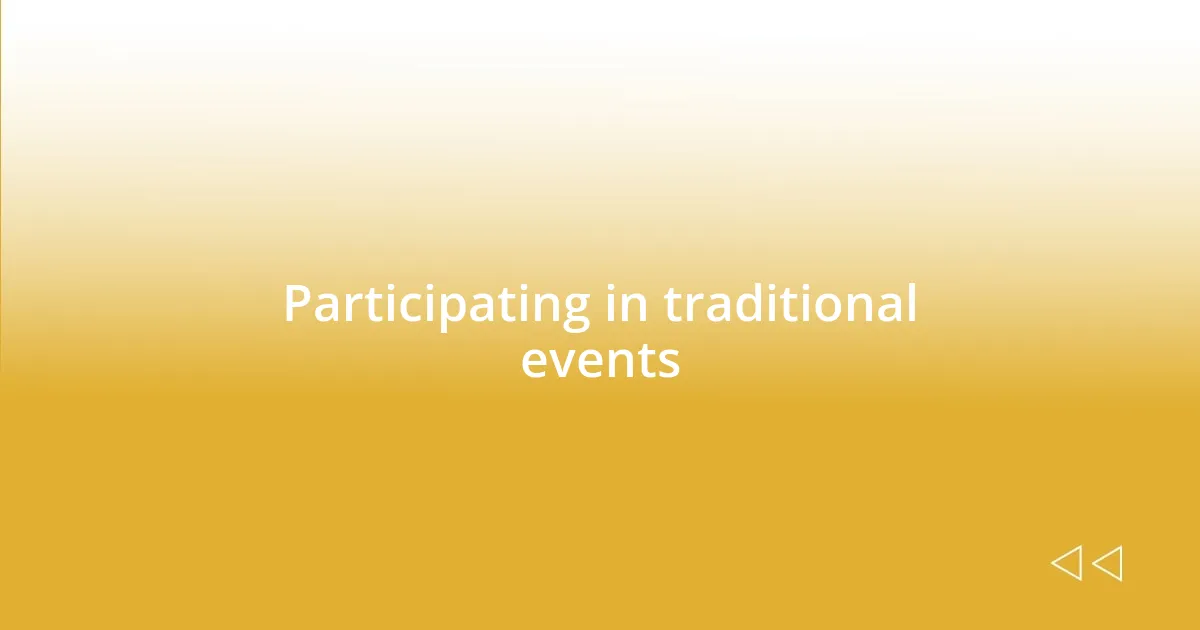
Participating in traditional events
Participating in traditional events has a unique way of making you feel genuinely connected to a culture. I vividly remember attending a harvest festival in a small Italian village. The aroma of fresh bread filled the air as locals gathered, laughing and sharing stories. It struck me how involved everyone was—from children participating in games to elders sharing their wisdom. Have you ever found yourself lost in a moment like that, where the joy of community just wraps around you?
One particularly unforgettable experience was dancing around the maypole during a midsummer celebration in Sweden. As I grasped the ribbons and twirled with others, I felt an exhilarating blend of tradition and spontaneity. The joy and laughter shared in those fleeting moments created an unspoken bond among us which transcended the boundaries of language. It made me reflect on how collective celebrations can unite us, reminding us of our shared humanity in the process.
Another touching moment occurred while attending a Diwali celebration with a family I met in India. As we lit diyas and enjoyed sweets, I was welcomed as part of the family. It felt overwhelming to see how traditions are passed down through generations, with everyone coming together to honor their heritage. Have you ever felt the warmth of a culture embracing you so wholly? It was one of those moments where I realized that participating in these events isn’t just about observing; it’s about truly feeling the rhythm of life pulsating through the community.
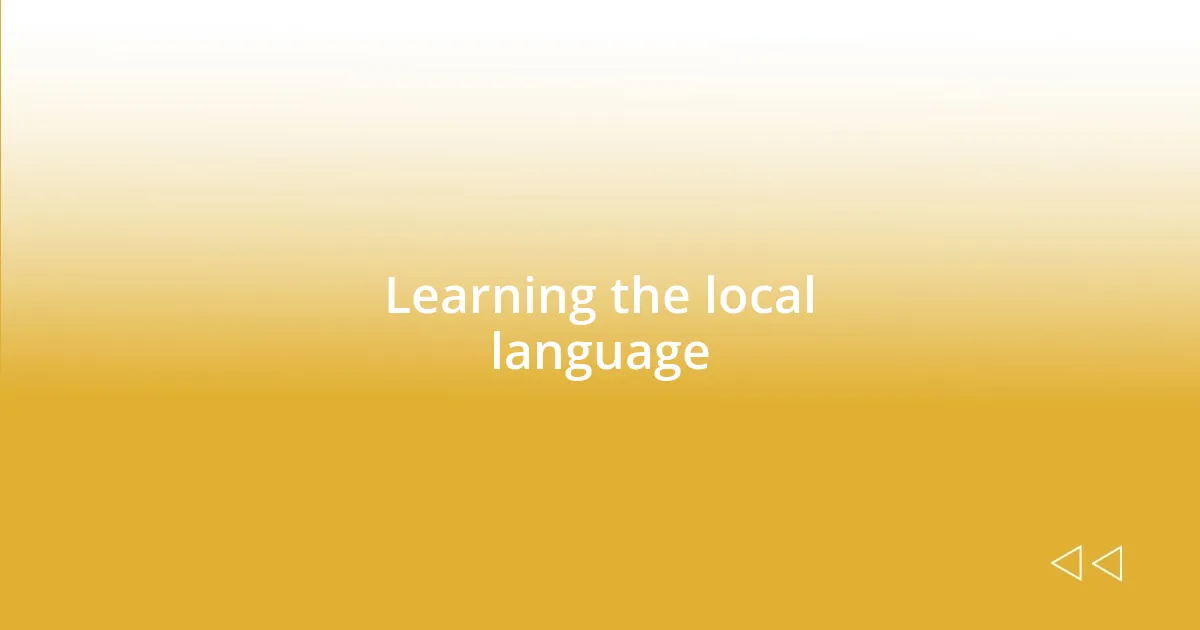
Learning the local language
Learning the local language can be one of the most enriching experiences during my travels. I recall sitting in a cozy café in Paris, nervously trying to order a croissant in French. Though my accent was less than perfect, the barista’s warm smile and encouraging nod made me realize that my effort was appreciated. Have you ever felt that exhilarating rush when you communicate in someone else’s language, even just a few words?
While living in Japan, I took up formal language classes that opened up new doors. Learning kanji was a daunting task, but when I could finally read street signs and menus, it felt like a triumphant victory. I remember the thrill of striking up small conversations with locals. Their surprise at my attempts transformed our exchanges into lively discussions, filled with laughter and cultural insights. Isn’t it fascinating how language can turn a simple interaction into a shared moment?
During my time in Brazil, I immersed myself in Portuguese through music and dance. Joining a samba class, I found that learning through rhythm made phrases easier to grasp. One evening, as we danced under the shimmering lights of a local festival, I shouted out the lyrics with newfound confidence. That moment of connection, singing with locals and feeling the music in my bones, taught me that language is not just about words; it’s the heart of culture, woven into the fabric of everyday life.
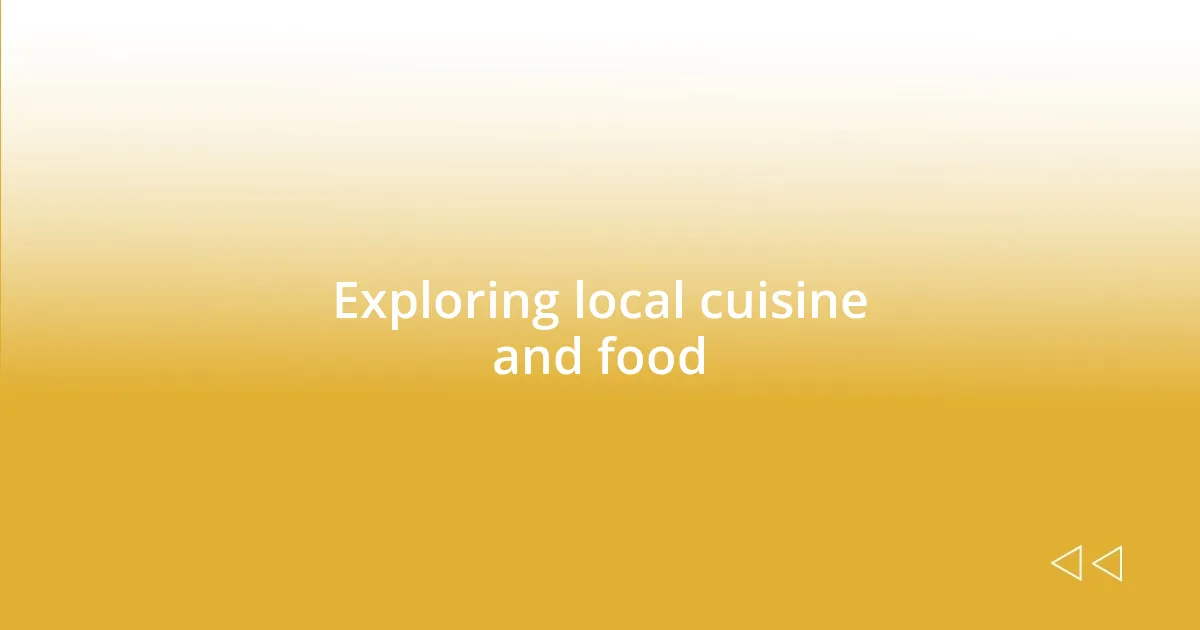
Exploring local cuisine and food
Exploring local cuisine has always been one of my favorite ways to immerse myself in a culture. I still remember a small, bustling market in Thailand, where the air was filled with fragrant spices and sizzling street food. I couldn’t resist trying everything from spicy papaya salad to creamy coconut curries. Each bite was a delightful adventure, opening my senses to new flavors and cooking techniques. Have you ever tasted something that transported you to another place entirely?
On another occasion, while visiting Mexico, I participated in a traditional cooking class. The instructor, a lively grandmother, shared her secret family recipes, which included handmade tortillas and rich mole sauce. As I rolled out the dough and stirred the simmering pot, I felt a deep connection to her stories of family gatherings around the table. Discovering how the ingredients reflected the local environment made me appreciate the artistry behind their cuisine. Isn’t it amazing how food can weave history and culture together?
I also had a heartwarming experience in the south of France when I joined friends for a communal meal—every dish came from local farms. The colorful platters of ratatouille and fresh baguette sparked conversations and laughter. I realized then that sharing food is a universal language, creating bonds that linger long after the meal is over. Have you ever felt that special connection over a shared dish, where the flavors intertwine with the friendships made? It’s moments like these that remind me of the joy found in exploring local cuisines.
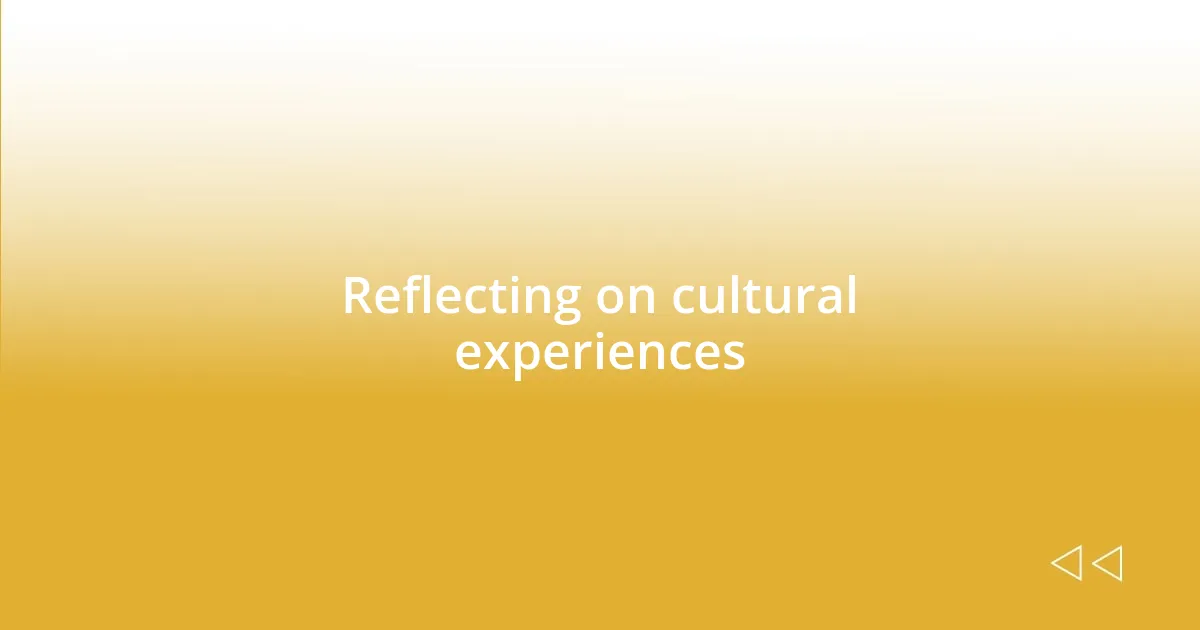
Reflecting on cultural experiences
Reflecting on cultural experiences often leads me to moments where I felt deeply connected to the ethos of a place. I recall a serene sunset in Santorini, where I sat on a terrace overlooking the caldera. As locals gathered to celebrate a festival, their laughter filled the air, and their joy became infectious. This shared energy made me realize that culture is not just in the sights we see but in the stories we share and the emotions we experience together. Have you ever been in a moment where you felt the heartbeat of a community?
One poignant memory took place during a Diwali celebration in India. The streets were alive with colorful lights and the sound of laughter, yet it was the warmth of the families inviting me to their homes that truly touched me. Sitting cross-legged on the floor, I savored the sweets they prepared and listened to the tales of their traditions. I appreciated how their stories and shared memories illuminated the importance of family and community ties. How often do we overlook the significance of personal connections in understanding culture?
Even in quieter moments, my reflections bring clarity. While sketching at a park in Morocco, I met an elderly artist who graciously shared his perspective on life and creativity. His insights painted a vivid picture of his culture’s history and struggles, resonating deeply within me. As he spoke, it struck me that reflecting on cultural experiences involves not just observing but actively engaging with the narratives that shape a place. Have you found wisdom in the stories of others that changed your perspective?










